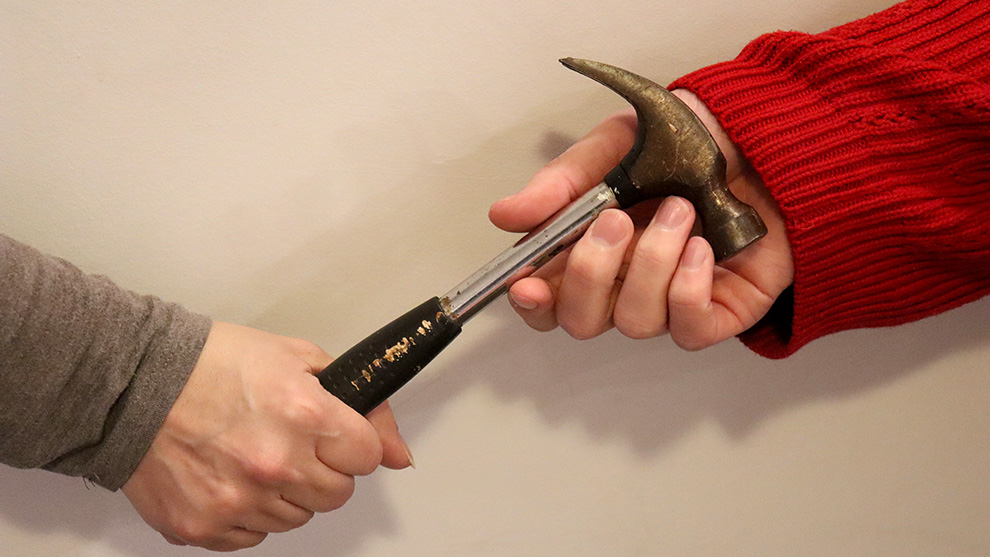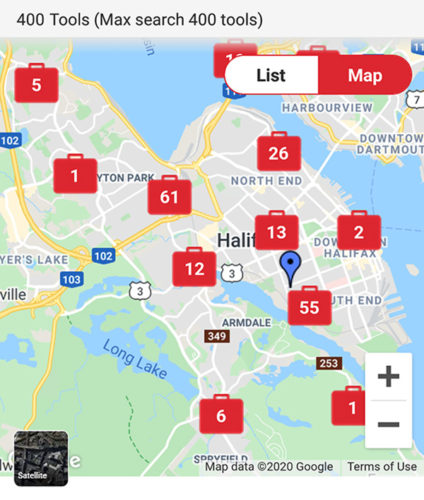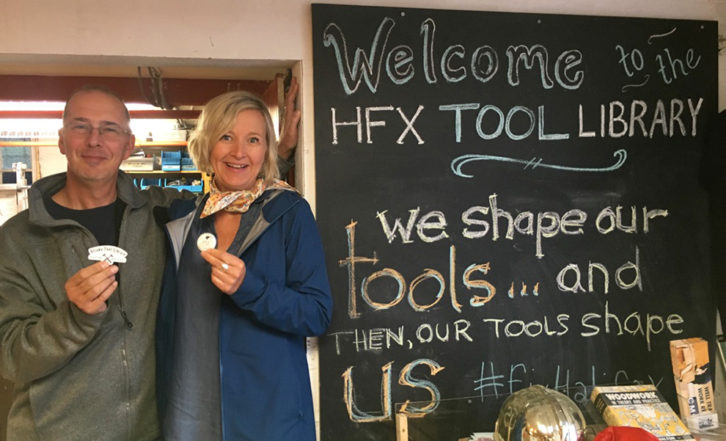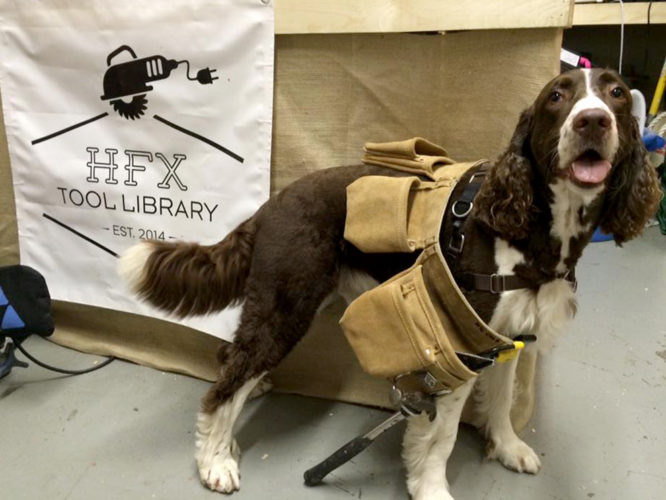Hammering out a deal: new tool rental app in Halifax
The Good Neighbour tool rental app launched in HRM last month, but some are concerned about its effects on community

caption
A new tool rental app, "The Good Neighbour," launched in HRM last month.After making inroads in Kelowna, Calgary, Winnipeg and Edmonton, a tool rental app called “The Good Neighbour” launched last month in HRM.
The app was originally developed by David Thiessen, a Kelowna-based electrician, about two and a half years ago. His business partner Joe McDonald lives in Halifax, and said the app is built on the Airbnb model of shared resources.
“Basically, we set up a network where those who need something are connected with those who have resources,” McDonald said.
Like Airbnb, The Good Neighbour takes a commission fee from each rental. Related stories
To date, 413 tools have been added by users in the municipality. The app is free to download, and users typically rent out tools for 1/10 of their value. Users can also increase or decrease their rental fee by 50 per cent, as they see fit. The distance of the tool is calculated for prospective renters as well.
“The vision ideally would be within anywhere say in Halifax, in a ten-block radius, there would be enough tools that you would never have to go beyond that range,” explained McDonald.
“Should you need, for instance, a planer or a bandsaw or a drill, within that area — that’s what we’ve seen in Edmonton — you sort of get these little clusters where you’ve got 2,000 or 2,500 tools,” said McDonald. “There’s virtually everything that you would possibly need within that range and they’re all, technically speaking, your neighbours.”

caption
A screenshot from the Good Neighbour app, showing a partial glimpse of where tool rentals are listed in HRM.As an example, a peek on The Good Neighbour app from south end Halifax on Friday showed that a crosscut hand saw, located 0 km away, could be rented for $3.08 a day. A DeWalt drill concrete hammer, 1 km away, was available at a daily rate of $35.50.
But tools aren’t strictly defined by the app’s parameters. A “black giant bicycle” can also be rented for $36.84 a day. In Edmonton, McDonald said, renting rec equipment like canoes and camping equipment through the app was very popular last summer.
The Good Neighbour offers a tool replacement guarantee, so anyone who doesn’t return a rental is charged through their credit card and the owner is reimbursed. McDonald said the app is great for people seeking items to rent, as tool rental costs are usually much cheaper than at tool rental shops. It’s also useful for those hoping to “make a little money on something that would have been just sitting there anyway.”
The app can be used anywhere in Canada, and isn’t confined to its established urban centres.
“There’s really no limitation for us,” McDonald said.
But not everyone has such a rosy view.
My take is that the commodification of all social relations is bad. Just lend your neighbours tools for free. pic.twitter.com/oeCywxpOl2
— Asian Flanders 🍞📈 (@cultureofdefeat) February 4, 2020
Chris Parsons is a public health care activist and writer. He elaborated on his tweet in an interview.
“I think the best way to describe it is that I think it’s [the app is] emblematic of a wider concern I have about the way that people relate to each other, which is that increasingly people can only understand social interaction with each other through financial exchange,” said Parsons.
Parsons pointed out that apps like the Good Neighbour don’t require the employees needed at other tool rental operations, and said the app essentially turns neighbours into contractors.
“We shouldn’t be requiring or be in a situation where people need to rent out their possessions to other people in order to make ends meet,” he said.
“If you see your neighbour needs to borrow a ladder, you should walk over and offer to lend them a ladder. I think it’s just a fundamental misunderstanding of what it means to be part of a community.”
Parsons said if there is a community need for tool sharing, the provincial library system should consider adding tools to its catalogue. He also highlighted the Halifax Tool Library as an existing non-profit already increasing tool access in HRM.
Hub for tool access and mentorship
The Halifax Tool Library (HTL) was established in 2014, and is still going strong with workshops, a women’s volunteer night, and an active volunteer base. Tools for the Halifax Tool Library are acquired by donation, and members can borrow items for a week at a time.
It costs $75 for an annual tool borrowing membership, and $150 for both an annual borrowing and workshop access membership. But for anyone who volunteers a couple of times a month, those membership fees are waived.
Clay Radcliffe, volunteer and president of the Halifax Tool Library board, said while he acknowledges the similarities, he doesn’t view The Good Neighbour app as competition for the HTL.
“On the surface, both the tool library and The Good Neighbour app and similar things like that are tapping into the wealth of the sharing economy. So it’s taking things that exist in our community and making them more broadly accessible to people,” he said.
“But everything else I would see as being fairly different.”

caption
Clay Radcliffe, president of the Halifax Tool Library board, poses with Bettina Vollmerhausen, who co-founded the Ottawa Tool Library.Radcliffe emphasized the passion involved in driving a non-profit, volunteer operation like the HTL, and said sharing knowledge is an important part of their organization.
“Lots of people who volunteer at the tool library have information about the tools, and tips and tricks about doing certain projects,” said Radcliffe. “There’s a mentorship that’s tied into the tool library and other tool libraries that I think isn’t always clearly understood until you come into the tool library and see how we interact with members.”
Radcliffe also said some DIY projects could require upwards of 100 tools, which would be much more easily accomplished using the HTL. But ultimately, he thinks space exists for both the HTL and The Good Neighbour in HRM.

caption
Lester the dog keeps his tools handy at the Halifax Tool Library.‘As human beings, we’ve changed’
Ed McHugh is a marketing professor at several post secondary institutions in HRM. He’s fascinated by the sharing economy, and said it’s “growing like crazy.”
“I think in North America we’ve had a history of wanting to own things, from our houses to our cars to everything else, and I think the generation that’s coming behind me sometimes doesn’t see why,” he said.
McHugh said he thinks environmental sustainability is “tucked in there as a neat little idea” when it comes to the sharing economy, but money is also a big factor.
“Anytime any of us can save a dollar, I think it’s got our attention,” he said.
McHugh sees the advantages of both the HTL and the Good Neighbour app as models for tool sharing. While he suspects the upfront costs of the HTL might work against it a bit, he likes that there’s a physical location, creating “kind of a club atmosphere.” And as a tool owner himself, McHugh said he thinks the Good Neighbour app is “a very good idea.”
“I think there’s absolutely a market for this,” he said.
But when asked if renting tools from neighbours could prove disruptive in a societal sense, he said “I think it could be.”
“You know, we’ve changed — as human beings, we’ve changed. We’re living more and more in cities, we’re moving out of the country, and so neighbours don’t know each other like they used to know each other,” said McHugh.
“We’ve changed from those more closely knit neighbourhoods to ones that are a little more separate, and so I think there’s been a big change there in terms of how people lend each other things like tools.”
About the author
Andrea McGuire
Andrea McGuire is a journalism student from Newfoundland. Before coming to King's College, she completed a master's degree in folklore at Memorial...
